MAA717 - Professional Judgment and Decision Making in Accounting
VerifiedAdded on 2023/06/12
|9
|1822
|301
Report
AI Summary
This report, prepared for the Chairman of the Australian Standard Accounting Boards, evaluates the use of professional judgment in accounting and its influence on users' decision-making. It investigates the role of professional judgment in preparing financial statements and generating accounting information, supported by a review of academic articles. The report discusses the framework of professional judgment, its increasing importance, and the challenges arising from its use, including factors influencing auditor judgment, potential misapplications, and complexities in business transactions and accounting standards. It concludes that professional judgment is critical for successful audits but should be exercised with skepticism and objectivity, supported by evidence and facts, to mitigate the risk of inappropriate opinions.
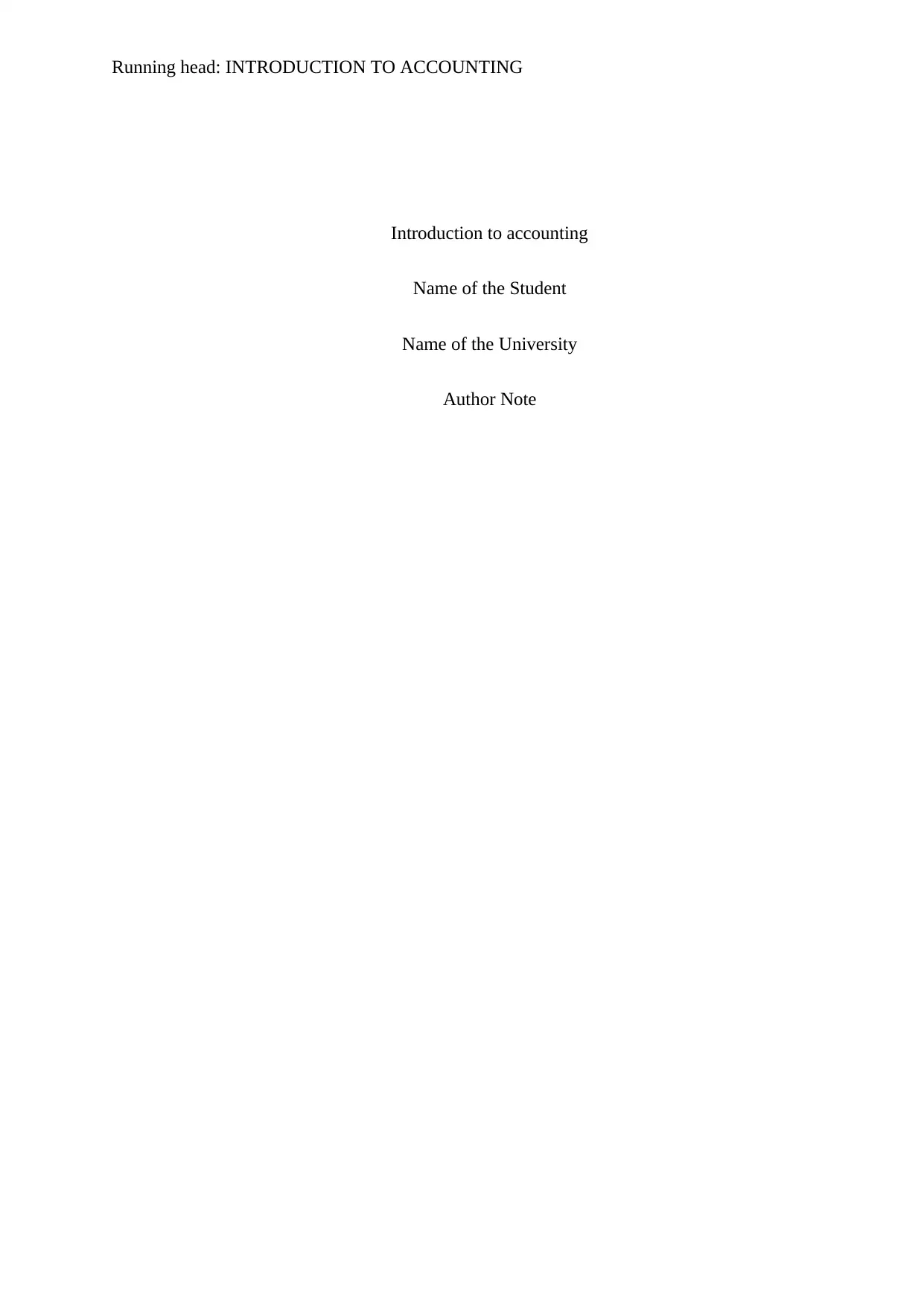
Running head: INTRODUCTION TO ACCOUNTING
Introduction to accounting
Name of the Student
Name of the University
Author Note
Introduction to accounting
Name of the Student
Name of the University
Author Note
Paraphrase This Document
Need a fresh take? Get an instant paraphrase of this document with our AI Paraphraser
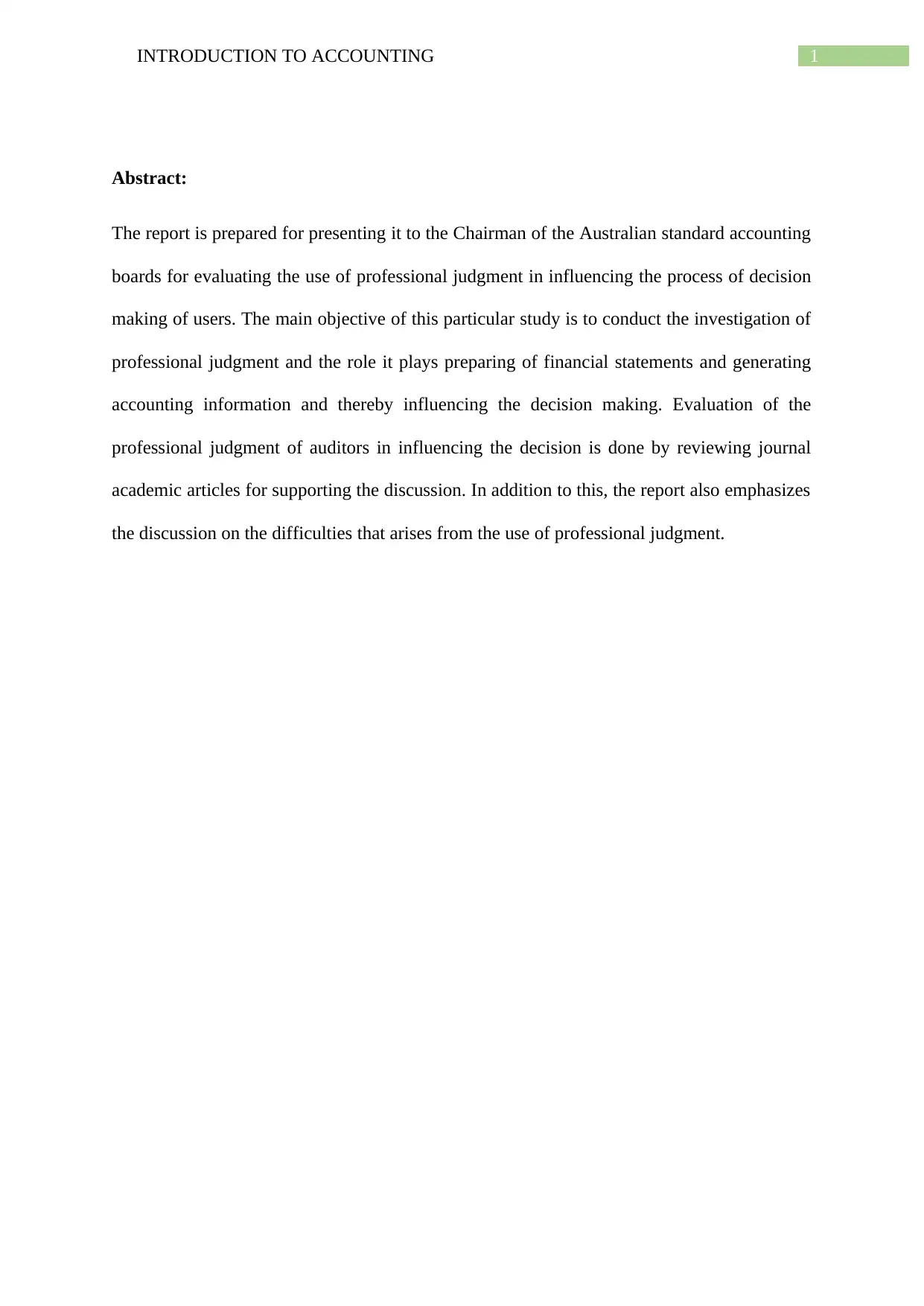
1INTRODUCTION TO ACCOUNTING
Abstract:
The report is prepared for presenting it to the Chairman of the Australian standard accounting
boards for evaluating the use of professional judgment in influencing the process of decision
making of users. The main objective of this particular study is to conduct the investigation of
professional judgment and the role it plays preparing of financial statements and generating
accounting information and thereby influencing the decision making. Evaluation of the
professional judgment of auditors in influencing the decision is done by reviewing journal
academic articles for supporting the discussion. In addition to this, the report also emphasizes
the discussion on the difficulties that arises from the use of professional judgment.
Abstract:
The report is prepared for presenting it to the Chairman of the Australian standard accounting
boards for evaluating the use of professional judgment in influencing the process of decision
making of users. The main objective of this particular study is to conduct the investigation of
professional judgment and the role it plays preparing of financial statements and generating
accounting information and thereby influencing the decision making. Evaluation of the
professional judgment of auditors in influencing the decision is done by reviewing journal
academic articles for supporting the discussion. In addition to this, the report also emphasizes
the discussion on the difficulties that arises from the use of professional judgment.
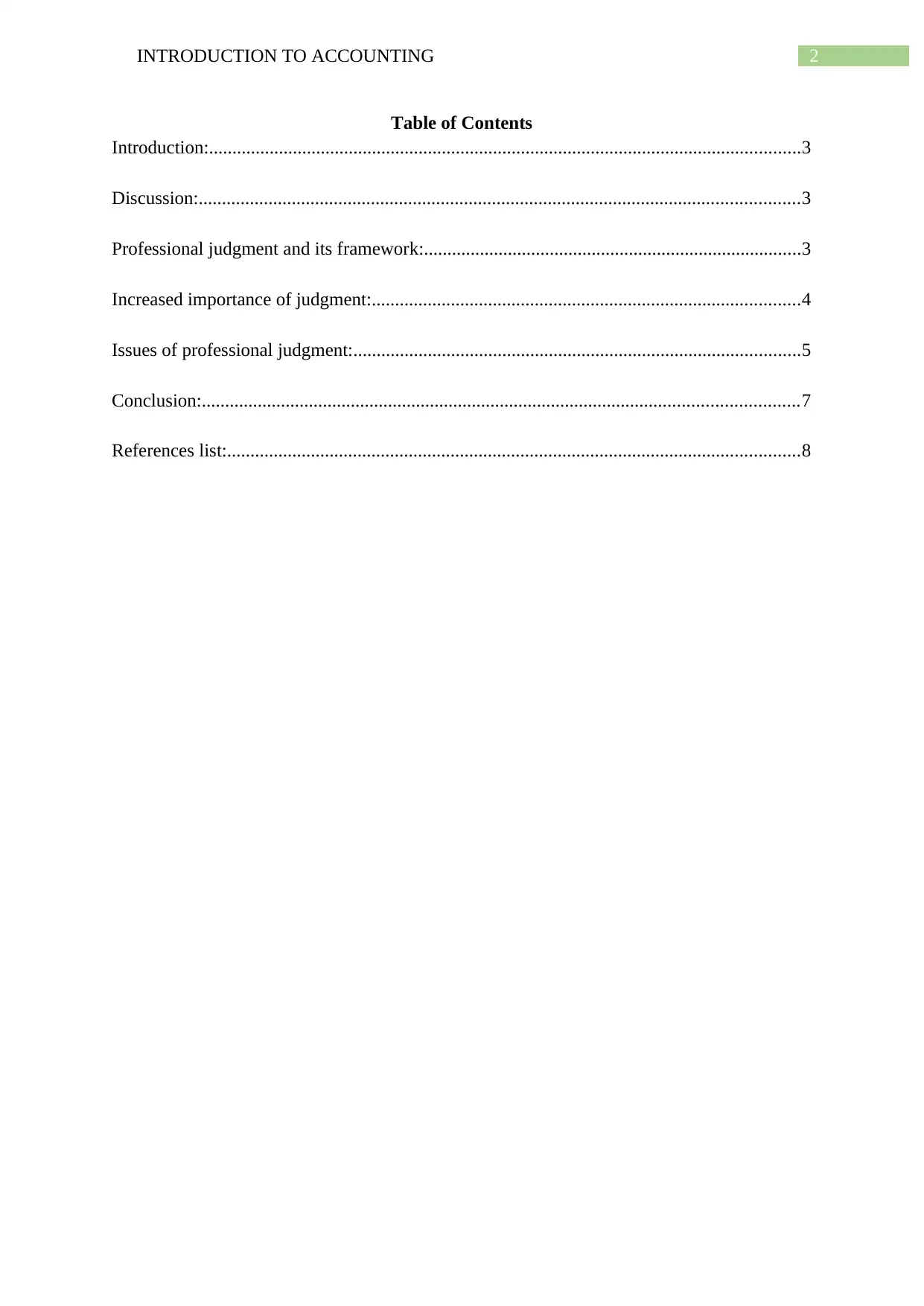
2INTRODUCTION TO ACCOUNTING
Table of Contents
Introduction:...............................................................................................................................3
Discussion:.................................................................................................................................3
Professional judgment and its framework:.................................................................................3
Increased importance of judgment:............................................................................................4
Issues of professional judgment:................................................................................................5
Conclusion:................................................................................................................................7
References list:...........................................................................................................................8
Table of Contents
Introduction:...............................................................................................................................3
Discussion:.................................................................................................................................3
Professional judgment and its framework:.................................................................................3
Increased importance of judgment:............................................................................................4
Issues of professional judgment:................................................................................................5
Conclusion:................................................................................................................................7
References list:...........................................................................................................................8
⊘ This is a preview!⊘
Do you want full access?
Subscribe today to unlock all pages.

Trusted by 1+ million students worldwide
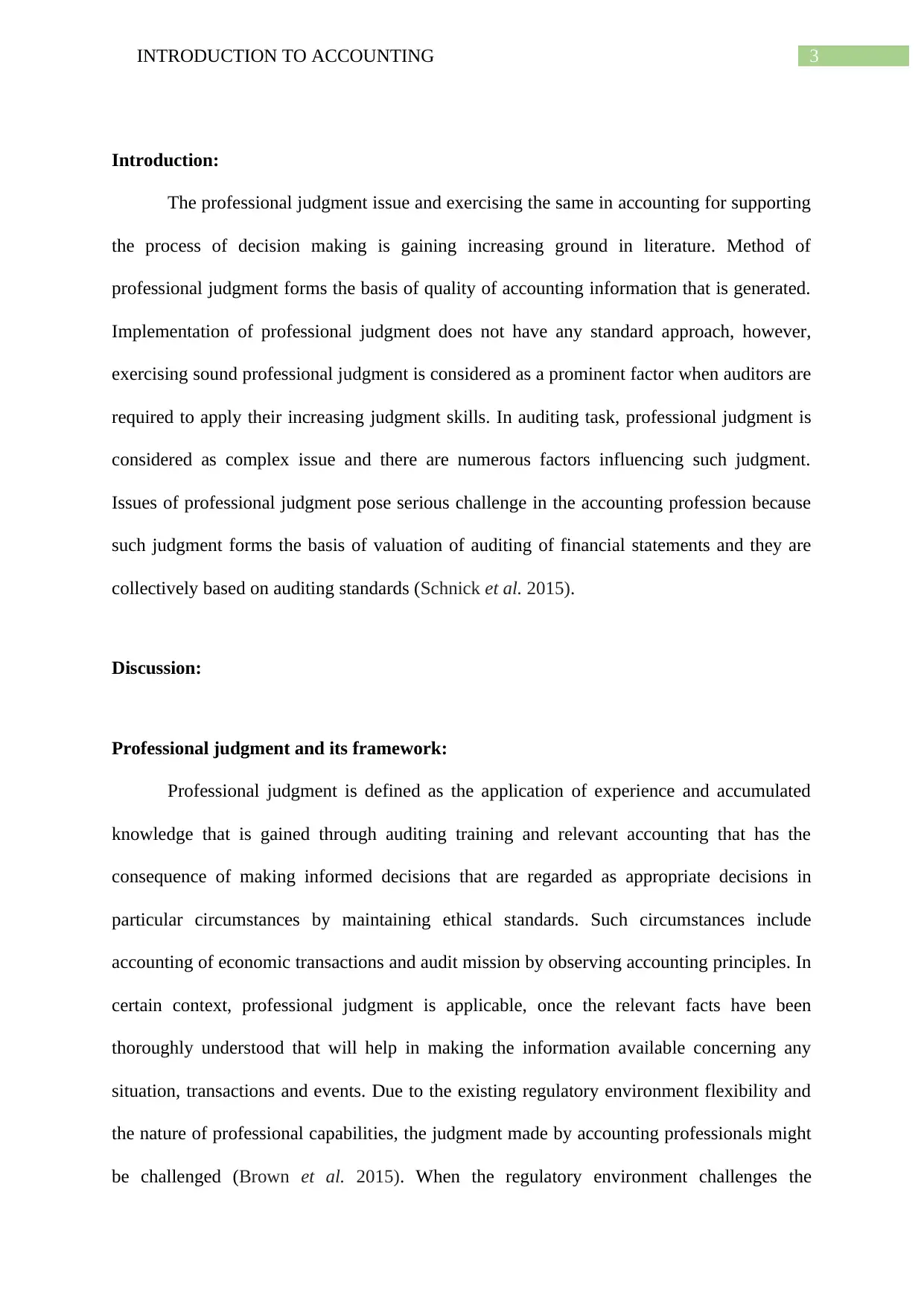
3INTRODUCTION TO ACCOUNTING
Introduction:
The professional judgment issue and exercising the same in accounting for supporting
the process of decision making is gaining increasing ground in literature. Method of
professional judgment forms the basis of quality of accounting information that is generated.
Implementation of professional judgment does not have any standard approach, however,
exercising sound professional judgment is considered as a prominent factor when auditors are
required to apply their increasing judgment skills. In auditing task, professional judgment is
considered as complex issue and there are numerous factors influencing such judgment.
Issues of professional judgment pose serious challenge in the accounting profession because
such judgment forms the basis of valuation of auditing of financial statements and they are
collectively based on auditing standards (Schnick et al. 2015).
Discussion:
Professional judgment and its framework:
Professional judgment is defined as the application of experience and accumulated
knowledge that is gained through auditing training and relevant accounting that has the
consequence of making informed decisions that are regarded as appropriate decisions in
particular circumstances by maintaining ethical standards. Such circumstances include
accounting of economic transactions and audit mission by observing accounting principles. In
certain context, professional judgment is applicable, once the relevant facts have been
thoroughly understood that will help in making the information available concerning any
situation, transactions and events. Due to the existing regulatory environment flexibility and
the nature of professional capabilities, the judgment made by accounting professionals might
be challenged (Brown et al. 2015). When the regulatory environment challenges the
Introduction:
The professional judgment issue and exercising the same in accounting for supporting
the process of decision making is gaining increasing ground in literature. Method of
professional judgment forms the basis of quality of accounting information that is generated.
Implementation of professional judgment does not have any standard approach, however,
exercising sound professional judgment is considered as a prominent factor when auditors are
required to apply their increasing judgment skills. In auditing task, professional judgment is
considered as complex issue and there are numerous factors influencing such judgment.
Issues of professional judgment pose serious challenge in the accounting profession because
such judgment forms the basis of valuation of auditing of financial statements and they are
collectively based on auditing standards (Schnick et al. 2015).
Discussion:
Professional judgment and its framework:
Professional judgment is defined as the application of experience and accumulated
knowledge that is gained through auditing training and relevant accounting that has the
consequence of making informed decisions that are regarded as appropriate decisions in
particular circumstances by maintaining ethical standards. Such circumstances include
accounting of economic transactions and audit mission by observing accounting principles. In
certain context, professional judgment is applicable, once the relevant facts have been
thoroughly understood that will help in making the information available concerning any
situation, transactions and events. Due to the existing regulatory environment flexibility and
the nature of professional capabilities, the judgment made by accounting professionals might
be challenged (Brown et al. 2015). When the regulatory environment challenges the
Paraphrase This Document
Need a fresh take? Get an instant paraphrase of this document with our AI Paraphraser
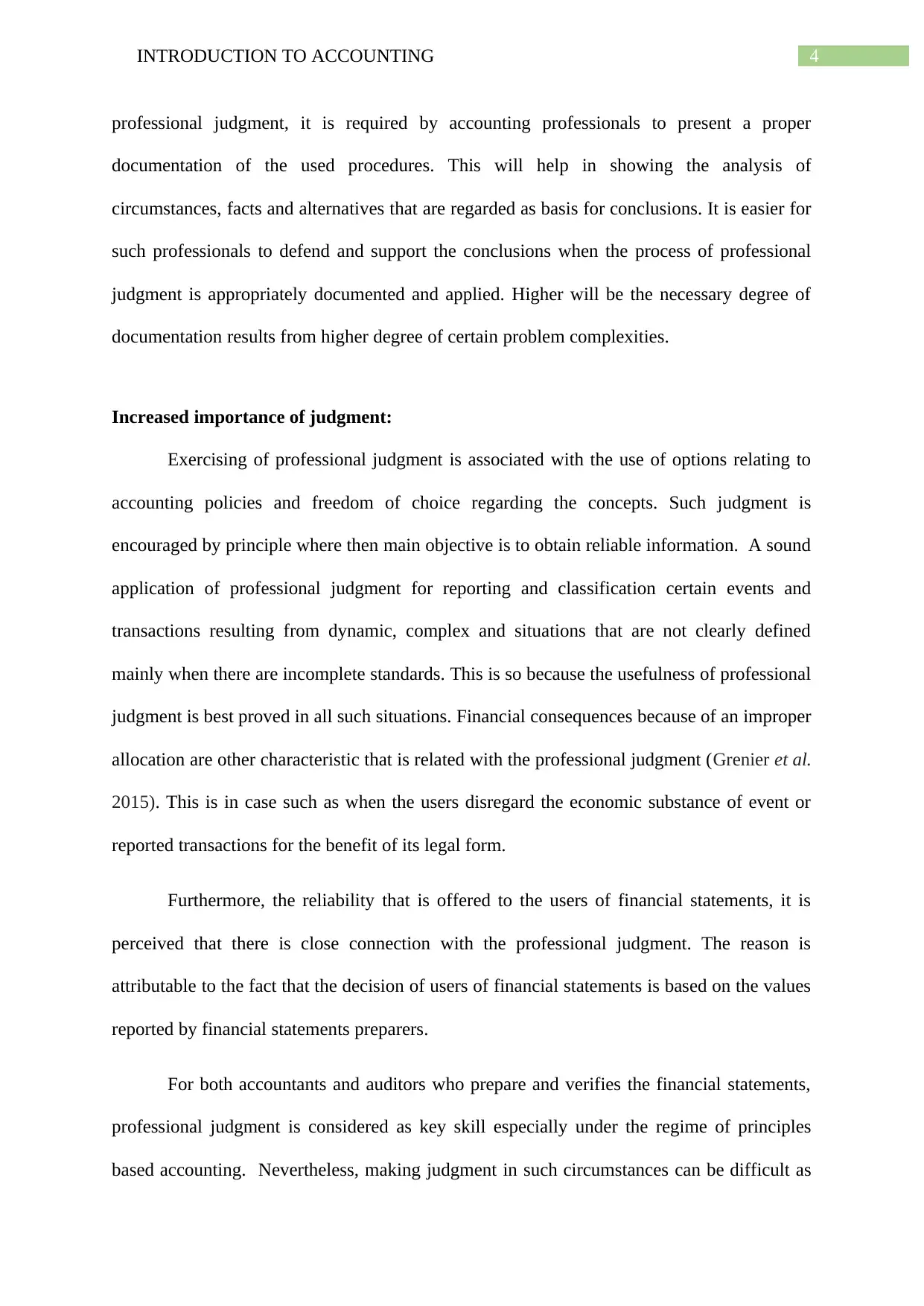
4INTRODUCTION TO ACCOUNTING
professional judgment, it is required by accounting professionals to present a proper
documentation of the used procedures. This will help in showing the analysis of
circumstances, facts and alternatives that are regarded as basis for conclusions. It is easier for
such professionals to defend and support the conclusions when the process of professional
judgment is appropriately documented and applied. Higher will be the necessary degree of
documentation results from higher degree of certain problem complexities.
Increased importance of judgment:
Exercising of professional judgment is associated with the use of options relating to
accounting policies and freedom of choice regarding the concepts. Such judgment is
encouraged by principle where then main objective is to obtain reliable information. A sound
application of professional judgment for reporting and classification certain events and
transactions resulting from dynamic, complex and situations that are not clearly defined
mainly when there are incomplete standards. This is so because the usefulness of professional
judgment is best proved in all such situations. Financial consequences because of an improper
allocation are other characteristic that is related with the professional judgment (Grenier et al.
2015). This is in case such as when the users disregard the economic substance of event or
reported transactions for the benefit of its legal form.
Furthermore, the reliability that is offered to the users of financial statements, it is
perceived that there is close connection with the professional judgment. The reason is
attributable to the fact that the decision of users of financial statements is based on the values
reported by financial statements preparers.
For both accountants and auditors who prepare and verifies the financial statements,
professional judgment is considered as key skill especially under the regime of principles
based accounting. Nevertheless, making judgment in such circumstances can be difficult as
professional judgment, it is required by accounting professionals to present a proper
documentation of the used procedures. This will help in showing the analysis of
circumstances, facts and alternatives that are regarded as basis for conclusions. It is easier for
such professionals to defend and support the conclusions when the process of professional
judgment is appropriately documented and applied. Higher will be the necessary degree of
documentation results from higher degree of certain problem complexities.
Increased importance of judgment:
Exercising of professional judgment is associated with the use of options relating to
accounting policies and freedom of choice regarding the concepts. Such judgment is
encouraged by principle where then main objective is to obtain reliable information. A sound
application of professional judgment for reporting and classification certain events and
transactions resulting from dynamic, complex and situations that are not clearly defined
mainly when there are incomplete standards. This is so because the usefulness of professional
judgment is best proved in all such situations. Financial consequences because of an improper
allocation are other characteristic that is related with the professional judgment (Grenier et al.
2015). This is in case such as when the users disregard the economic substance of event or
reported transactions for the benefit of its legal form.
Furthermore, the reliability that is offered to the users of financial statements, it is
perceived that there is close connection with the professional judgment. The reason is
attributable to the fact that the decision of users of financial statements is based on the values
reported by financial statements preparers.
For both accountants and auditors who prepare and verifies the financial statements,
professional judgment is considered as key skill especially under the regime of principles
based accounting. Nevertheless, making judgment in such circumstances can be difficult as
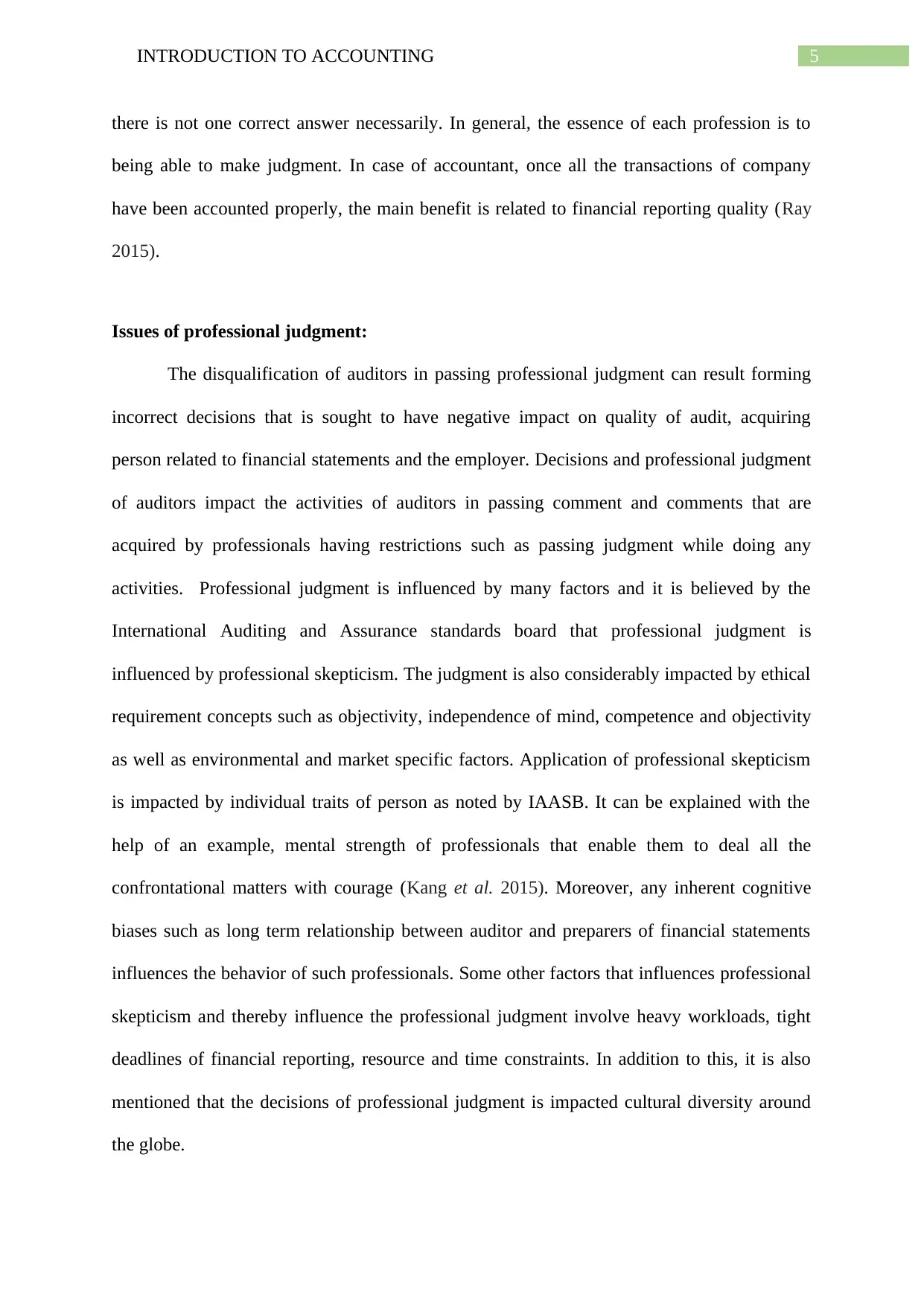
5INTRODUCTION TO ACCOUNTING
there is not one correct answer necessarily. In general, the essence of each profession is to
being able to make judgment. In case of accountant, once all the transactions of company
have been accounted properly, the main benefit is related to financial reporting quality (Ray
2015).
Issues of professional judgment:
The disqualification of auditors in passing professional judgment can result forming
incorrect decisions that is sought to have negative impact on quality of audit, acquiring
person related to financial statements and the employer. Decisions and professional judgment
of auditors impact the activities of auditors in passing comment and comments that are
acquired by professionals having restrictions such as passing judgment while doing any
activities. Professional judgment is influenced by many factors and it is believed by the
International Auditing and Assurance standards board that professional judgment is
influenced by professional skepticism. The judgment is also considerably impacted by ethical
requirement concepts such as objectivity, independence of mind, competence and objectivity
as well as environmental and market specific factors. Application of professional skepticism
is impacted by individual traits of person as noted by IAASB. It can be explained with the
help of an example, mental strength of professionals that enable them to deal all the
confrontational matters with courage (Kang et al. 2015). Moreover, any inherent cognitive
biases such as long term relationship between auditor and preparers of financial statements
influences the behavior of such professionals. Some other factors that influences professional
skepticism and thereby influence the professional judgment involve heavy workloads, tight
deadlines of financial reporting, resource and time constraints. In addition to this, it is also
mentioned that the decisions of professional judgment is impacted cultural diversity around
the globe.
there is not one correct answer necessarily. In general, the essence of each profession is to
being able to make judgment. In case of accountant, once all the transactions of company
have been accounted properly, the main benefit is related to financial reporting quality (Ray
2015).
Issues of professional judgment:
The disqualification of auditors in passing professional judgment can result forming
incorrect decisions that is sought to have negative impact on quality of audit, acquiring
person related to financial statements and the employer. Decisions and professional judgment
of auditors impact the activities of auditors in passing comment and comments that are
acquired by professionals having restrictions such as passing judgment while doing any
activities. Professional judgment is influenced by many factors and it is believed by the
International Auditing and Assurance standards board that professional judgment is
influenced by professional skepticism. The judgment is also considerably impacted by ethical
requirement concepts such as objectivity, independence of mind, competence and objectivity
as well as environmental and market specific factors. Application of professional skepticism
is impacted by individual traits of person as noted by IAASB. It can be explained with the
help of an example, mental strength of professionals that enable them to deal all the
confrontational matters with courage (Kang et al. 2015). Moreover, any inherent cognitive
biases such as long term relationship between auditor and preparers of financial statements
influences the behavior of such professionals. Some other factors that influences professional
skepticism and thereby influence the professional judgment involve heavy workloads, tight
deadlines of financial reporting, resource and time constraints. In addition to this, it is also
mentioned that the decisions of professional judgment is impacted cultural diversity around
the globe.
⊘ This is a preview!⊘
Do you want full access?
Subscribe today to unlock all pages.

Trusted by 1+ million students worldwide
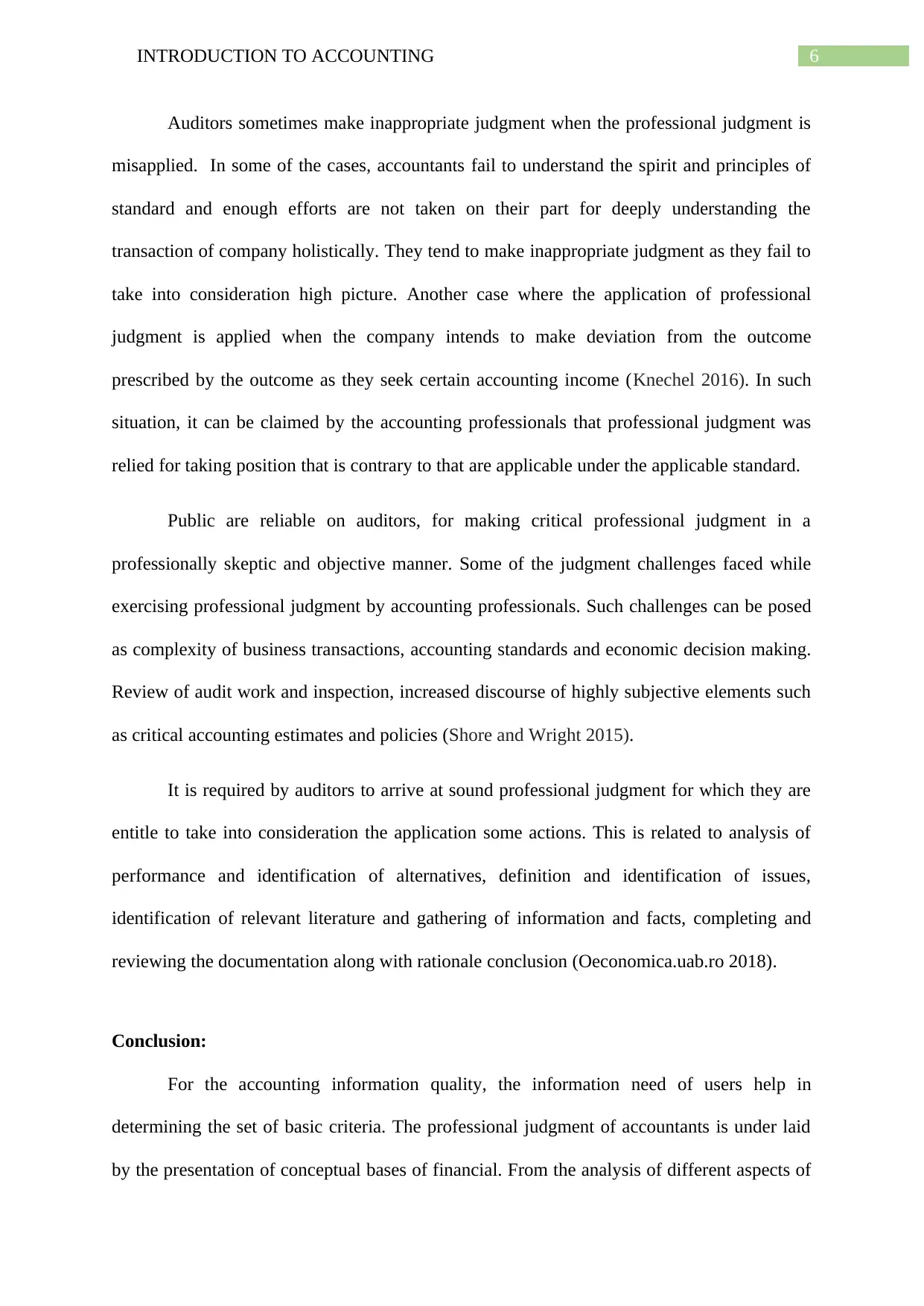
6INTRODUCTION TO ACCOUNTING
Auditors sometimes make inappropriate judgment when the professional judgment is
misapplied. In some of the cases, accountants fail to understand the spirit and principles of
standard and enough efforts are not taken on their part for deeply understanding the
transaction of company holistically. They tend to make inappropriate judgment as they fail to
take into consideration high picture. Another case where the application of professional
judgment is applied when the company intends to make deviation from the outcome
prescribed by the outcome as they seek certain accounting income (Knechel 2016). In such
situation, it can be claimed by the accounting professionals that professional judgment was
relied for taking position that is contrary to that are applicable under the applicable standard.
Public are reliable on auditors, for making critical professional judgment in a
professionally skeptic and objective manner. Some of the judgment challenges faced while
exercising professional judgment by accounting professionals. Such challenges can be posed
as complexity of business transactions, accounting standards and economic decision making.
Review of audit work and inspection, increased discourse of highly subjective elements such
as critical accounting estimates and policies (Shore and Wright 2015).
It is required by auditors to arrive at sound professional judgment for which they are
entitle to take into consideration the application some actions. This is related to analysis of
performance and identification of alternatives, definition and identification of issues,
identification of relevant literature and gathering of information and facts, completing and
reviewing the documentation along with rationale conclusion (Oeconomica.uab.ro 2018).
Conclusion:
For the accounting information quality, the information need of users help in
determining the set of basic criteria. The professional judgment of accountants is under laid
by the presentation of conceptual bases of financial. From the analysis of different aspects of
Auditors sometimes make inappropriate judgment when the professional judgment is
misapplied. In some of the cases, accountants fail to understand the spirit and principles of
standard and enough efforts are not taken on their part for deeply understanding the
transaction of company holistically. They tend to make inappropriate judgment as they fail to
take into consideration high picture. Another case where the application of professional
judgment is applied when the company intends to make deviation from the outcome
prescribed by the outcome as they seek certain accounting income (Knechel 2016). In such
situation, it can be claimed by the accounting professionals that professional judgment was
relied for taking position that is contrary to that are applicable under the applicable standard.
Public are reliable on auditors, for making critical professional judgment in a
professionally skeptic and objective manner. Some of the judgment challenges faced while
exercising professional judgment by accounting professionals. Such challenges can be posed
as complexity of business transactions, accounting standards and economic decision making.
Review of audit work and inspection, increased discourse of highly subjective elements such
as critical accounting estimates and policies (Shore and Wright 2015).
It is required by auditors to arrive at sound professional judgment for which they are
entitle to take into consideration the application some actions. This is related to analysis of
performance and identification of alternatives, definition and identification of issues,
identification of relevant literature and gathering of information and facts, completing and
reviewing the documentation along with rationale conclusion (Oeconomica.uab.ro 2018).
Conclusion:
For the accounting information quality, the information need of users help in
determining the set of basic criteria. The professional judgment of accountants is under laid
by the presentation of conceptual bases of financial. From the analysis of different aspects of
Paraphrase This Document
Need a fresh take? Get an instant paraphrase of this document with our AI Paraphraser
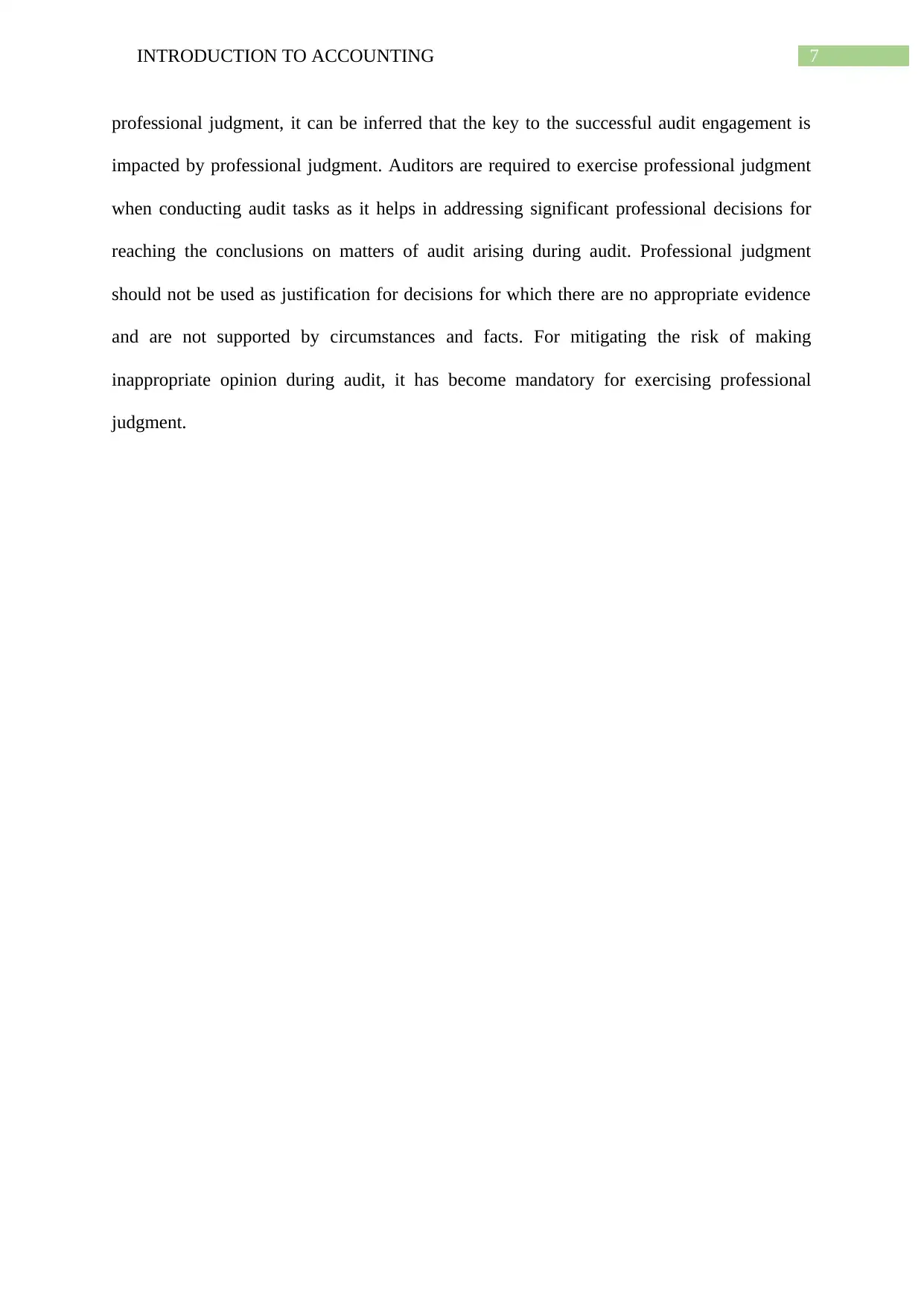
7INTRODUCTION TO ACCOUNTING
professional judgment, it can be inferred that the key to the successful audit engagement is
impacted by professional judgment. Auditors are required to exercise professional judgment
when conducting audit tasks as it helps in addressing significant professional decisions for
reaching the conclusions on matters of audit arising during audit. Professional judgment
should not be used as justification for decisions for which there are no appropriate evidence
and are not supported by circumstances and facts. For mitigating the risk of making
inappropriate opinion during audit, it has become mandatory for exercising professional
judgment.
professional judgment, it can be inferred that the key to the successful audit engagement is
impacted by professional judgment. Auditors are required to exercise professional judgment
when conducting audit tasks as it helps in addressing significant professional decisions for
reaching the conclusions on matters of audit arising during audit. Professional judgment
should not be used as justification for decisions for which there are no appropriate evidence
and are not supported by circumstances and facts. For mitigating the risk of making
inappropriate opinion during audit, it has become mandatory for exercising professional
judgment.
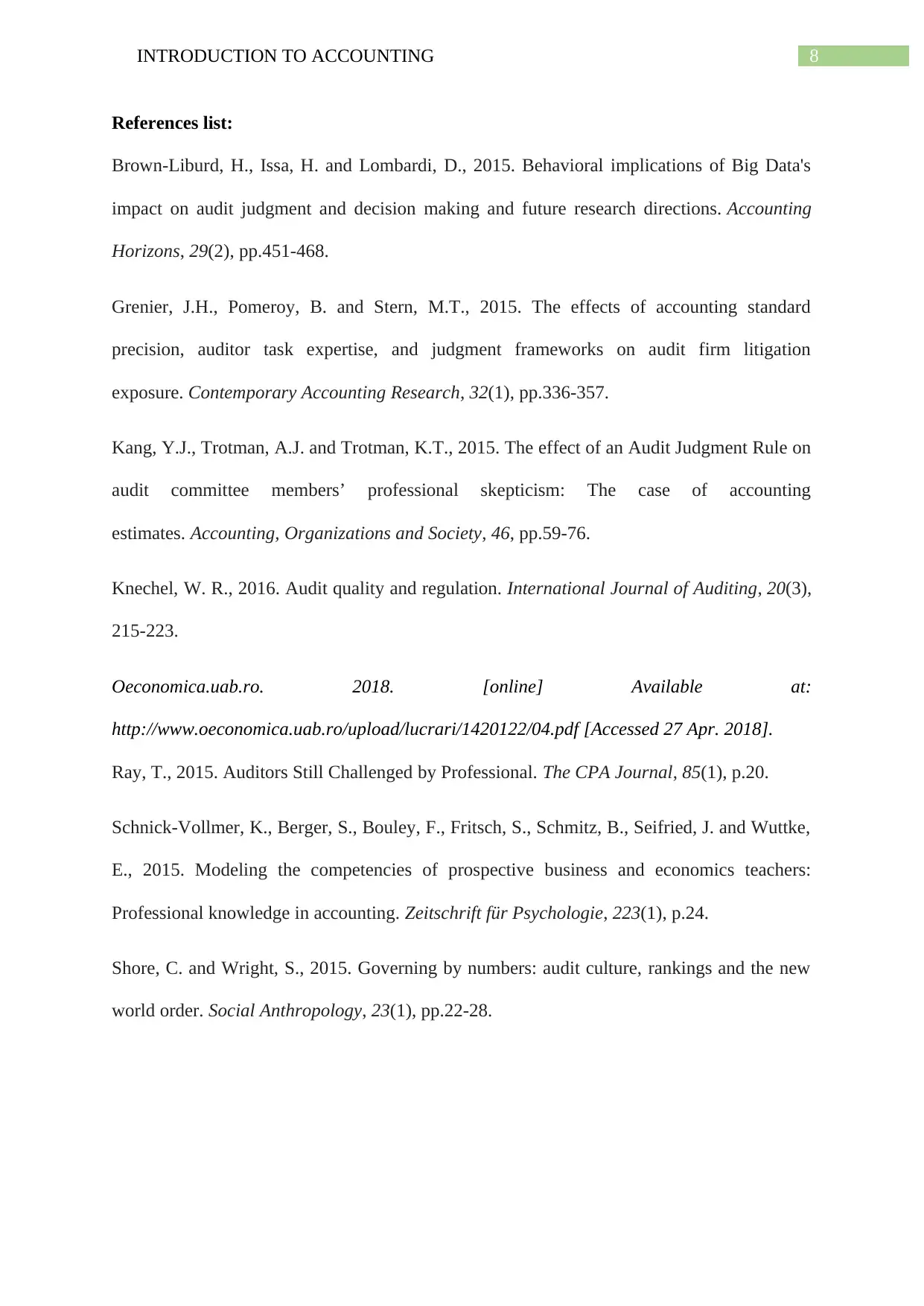
8INTRODUCTION TO ACCOUNTING
References list:
Brown-Liburd, H., Issa, H. and Lombardi, D., 2015. Behavioral implications of Big Data's
impact on audit judgment and decision making and future research directions. Accounting
Horizons, 29(2), pp.451-468.
Grenier, J.H., Pomeroy, B. and Stern, M.T., 2015. The effects of accounting standard
precision, auditor task expertise, and judgment frameworks on audit firm litigation
exposure. Contemporary Accounting Research, 32(1), pp.336-357.
Kang, Y.J., Trotman, A.J. and Trotman, K.T., 2015. The effect of an Audit Judgment Rule on
audit committee members’ professional skepticism: The case of accounting
estimates. Accounting, Organizations and Society, 46, pp.59-76.
Knechel, W. R., 2016. Audit quality and regulation. International Journal of Auditing, 20(3),
215-223.
Oeconomica.uab.ro. 2018. [online] Available at:
http://www.oeconomica.uab.ro/upload/lucrari/1420122/04.pdf [Accessed 27 Apr. 2018].
Ray, T., 2015. Auditors Still Challenged by Professional. The CPA Journal, 85(1), p.20.
Schnick-Vollmer, K., Berger, S., Bouley, F., Fritsch, S., Schmitz, B., Seifried, J. and Wuttke,
E., 2015. Modeling the competencies of prospective business and economics teachers:
Professional knowledge in accounting. Zeitschrift für Psychologie, 223(1), p.24.
Shore, C. and Wright, S., 2015. Governing by numbers: audit culture, rankings and the new
world order. Social Anthropology, 23(1), pp.22-28.
References list:
Brown-Liburd, H., Issa, H. and Lombardi, D., 2015. Behavioral implications of Big Data's
impact on audit judgment and decision making and future research directions. Accounting
Horizons, 29(2), pp.451-468.
Grenier, J.H., Pomeroy, B. and Stern, M.T., 2015. The effects of accounting standard
precision, auditor task expertise, and judgment frameworks on audit firm litigation
exposure. Contemporary Accounting Research, 32(1), pp.336-357.
Kang, Y.J., Trotman, A.J. and Trotman, K.T., 2015. The effect of an Audit Judgment Rule on
audit committee members’ professional skepticism: The case of accounting
estimates. Accounting, Organizations and Society, 46, pp.59-76.
Knechel, W. R., 2016. Audit quality and regulation. International Journal of Auditing, 20(3),
215-223.
Oeconomica.uab.ro. 2018. [online] Available at:
http://www.oeconomica.uab.ro/upload/lucrari/1420122/04.pdf [Accessed 27 Apr. 2018].
Ray, T., 2015. Auditors Still Challenged by Professional. The CPA Journal, 85(1), p.20.
Schnick-Vollmer, K., Berger, S., Bouley, F., Fritsch, S., Schmitz, B., Seifried, J. and Wuttke,
E., 2015. Modeling the competencies of prospective business and economics teachers:
Professional knowledge in accounting. Zeitschrift für Psychologie, 223(1), p.24.
Shore, C. and Wright, S., 2015. Governing by numbers: audit culture, rankings and the new
world order. Social Anthropology, 23(1), pp.22-28.
⊘ This is a preview!⊘
Do you want full access?
Subscribe today to unlock all pages.

Trusted by 1+ million students worldwide
1 out of 9
Related Documents
Your All-in-One AI-Powered Toolkit for Academic Success.
+13062052269
info@desklib.com
Available 24*7 on WhatsApp / Email
![[object Object]](/_next/static/media/star-bottom.7253800d.svg)
Unlock your academic potential
Copyright © 2020–2026 A2Z Services. All Rights Reserved. Developed and managed by ZUCOL.





